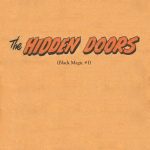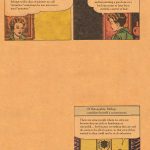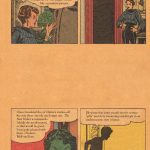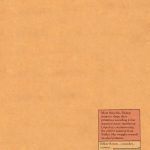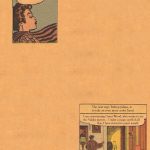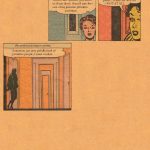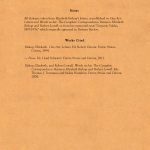Two down. Two Greyhound days down, and Texas by morning, so Billy figured. Dallas by noon, and then, who could say? Across the bus’s wide aisle from him, Sam slept, her boy tucked into the crook of her back, the both of them curled against the upholstered plastic of two cruddy seats. Sam cropped her hair high and tight, like a boy’s, like her boy’s, but it had grown out of late, pressing up from her scalp in ragged shoots. Messy. Ugly. Billy sprawled himself over two seats of his own, one sneakered leg thrown sideways from his hip into the empty aisle seat, a single sentence writ across his face: “I dare you to sit with me, motherfucker.” Dallas by noon, and then, a new life to last him for good. Girl and girl’s bastard in tow, but a life of unknown newness nonetheless.
Boy and mother turned in dream. The boy woke for a moment and scrambled to his mother’s lap. Lodged against her breasts, the boy folded his feet into the seam of Sam’s legs. Thomas. Small for four, already blessed by thick glasses with brown, gawky frames, the only ones available to the state Medicaid patients. The boy wore a button-up shirt beneath a natty pullover vest, though the temperature had topped eighty the long way across Indiana. Thomas’s wrists were thin. Thin wrists meant a boy would always be small, even when he grew. Like with feet on a kitten, the forever smallness of things betrayed by wrists and feet.
Billy held up his own hands. His wrists were solid, comfortingly so.
Outside, the last, drab Hoosier fields passed by, Michigan long gone. Corn melded on the pane with the boy’s mirrored, blond head.
Billy knew that Thomas would grow up to be an outcast, too weak for sports, too gangly for girls. He pitied the boy, saw how much a problem the boy already was and, from the look of his bones, would always be. High school, where Billy had shined, would be awful for the boy, and there was Billy in that satin-framed future, around to see the whole damn pageant. Unless Thomas someday found the thin-wrested gumption to run away in the steep of night.
Billy bent to Sam, to kiss her, but the smell of her made him stop. She’d not had a good wash, anything more than a splashdown from a tepid faucet in a truck stop restroom outside LaPorte in more than a day. He hated Sam’s smell when she hadn’t washed. She didn’t smell like a woman, so he thought, but more like old milk left out on a counter. And he’d done that once, in a Southfield apartment, gone and left a gallon of milk out behind a pile of dirty dishes after he was done eating a bowl of Corn Flakes. Days passed before he remembered, tracked down the faint hissing sound which had plagued his space for days, the sussurations of the sour milk’s vapors in escape from around the cap. The bottle, swollen fat and pregnant, he’d thrown carefully away.
Billy fancied himself an expert on scent. Scent was the hook, not looks or money, that really attracted one of a pair to another, nothing but scent. Pheromones, the odors a body produced by the natural order of being a body and which really did it for some other poor sack of blind and groping meat. A part of Billy supposed, maybe, that he should love Sam even when dirty, when awake or asleep, but he could only smell what he smelled, only the scents brought to his waiting nose, what came.
Billy also knew that the boy, Thomas, was the real problem between them. Not bad scent. Without Thomas, he and Sam could’ve left D-Town years ago, escaped to warmer nights and better jobs, because Sam wouldn’t have needed her mother for day care and diaper cash. If he’d met Sam before whoever-was-Dad had done, they’d already be gone, years hence, a few short but happy lifetimes ago.
Billy thought of Mary Saunders from his twelfth-grade homeroom. Near on five years had passed since he’d sat next to that crazy Mary. Mary Carrie they’d called her, after the movie. While he waited for the first-period bell, she’d make eyes on the pages of her notebook, scores of them, like laden plates of fish-egg bait. He’d never been close enough to smell her to tell if she had good pheromones, but he’d bet not. Sour for certain, full of salt and old cold cream.
Sam stirred, pushing against the child on her lap.
“My leg’s asleep,” she said, before turning her head to the window.
She revolved her body as far away from Billy as she could, and Thomas’s right leg slipped off her knee. The high-top sneaker hit the underside of the seat in front of them with a metallic ping, bounced off a heater grate, and so many miles rolled by, Billy’s head flushed awash in visions. He became lost among visionaries. He was lost already.
—
Dallas was hot that June. The temperature reads they passed in the taxi, going from the bus station to the motel, blared 104, 105 in gaudy florescence, like advertisements for the pleasanter coast of Hell. People outside walked briskly with their shoulders squared and their backs erect, moving as though proud that they were here, swarming in the heat and taking it well.
“This is awful,” Sam said. “A hundred and five? Give me a fucking break.”
“Dry heat,” Billy said. “You can feel the difference. Ninety’ll break a back in Michigan because of the humidity. Humidity’s what makes heat rough.”
“We shouldn’t have done this,” she said.
“My great-grandfather,” he said. “You know what he wanted? He wanted to marry a Dutch girl before he came to America. He tried to find the right woman for weeks. Couldn’t do it, but he looked, right up until they loaded his bags on the boat. Still, he wanted a girl from home, so you know what he did?”
“Gave up?” she asked. “Got on the boat by himself like a grown-up?”
“He went to a brothel, right there in Amsterdam, asked if any of the girls would marry him. ‘Somebody wanna marry me?’ he asked. ‘Get up right now and I’ll pay your way to America.’ So my great-gramma, she stood up and said she’d do it. She came with him.”
“Great,” Sam said. “I’m thrilled. It’s still too hot.”
“They were married fifty-seven years,” Billy said, nodding. “We could be like that, you and me, if you got a better attitude.”
“So if I get a better attitude,” Sam said, “I can be a whore. Bought and borne for your stupid ass.”
Though Billy searched her for intent—jest or wrath—he saw only the long lines of her face gaping back at him. Her eyes were closed, her mouth thin-lipped, her arms held close to her chest. Her body braced, all of her an oracle of nothing, a fount of excommunication.
—
They bought a room for the night, one with a single bed, wood paneling, and no AC. Sam cracked the lone window as far as it would go, three or four inches, before the painted-clogged jamb stopped its slide dead. She craned her neck askance and put her face into the crevice. She grimaced, scrunching her features shut and strained. Billy could swear her face pinched and shrunk, as though trying to slide out between the frames.
Thomas sat on the corner of the bed, rummaging through his tiny, hard plastic suitcase. The contents were limited, only a shirt or two and a pair of swimming trunks. Sam had wanted him to have something to carry, to train him a little with some responsibility, but he had nothing that couldn’t be replaced if he left the bag behind in a gas station bathroom. From somewhere deep within the case, a pocket that Billy couldn’t even see, the boy pulled out a stuffed animal he’d ferreted away on his own, a toy ghost come all the way from Detroit.
Billy frowned. “What the hell is that?”
“Super Banana,” Thomas answered.
“Oh, leave him alone, will you,” Sam said from her window. She lay flat on the sill, fanning her face with a Mexican take-out menu someone had left on the peeling Formica countertop in the ‘kitchen,’ just a nook on the far side of the room that couched a sink and a battered, broken stove.
“He is a boy, isn’t he?” Billy asked.
“He’s four.”
“So he can still be a four-year-old with some balls.”
Thomas ignored them, flying his stuffed, man-shaped banana around the room. The toy had arms and legs made of rainbow shoestrings. Machined, white leather hands and sneakers. As he dragged the toy across the end table beside the bed, which held nothing but a single lamp and an ashtray, one of the toy’s legs caught in the ashtray’s cigarette rest, and, as he flew it by, the boy pulled the ashtray off the table and across the bed, still attached to the banana. Leftover, metal-gray ashes spilled out onto the ivory sheet. Billy stared at the pile, on his side of the bed. He let out a long sigh and stood immobile.
Thomas stopped playing and tried to tug the toy loose, but the leg was wedged in good. A minute and the boy whimpered, then softly cried.
Vacating the window, Sam came to him. She cradled his shoulders and removed the toy from his hands. Gently, she pulled the leg free of the ashtray.
“Maybe I should cry, too,” Billy said. “Until somebody helps me. It’s my money for this palace. My job quit. My ass in the ashpile.”
“Don’t,” Sam said, hugging her boy.
“A place like this won’t change the sheets twice. You know that as good as me.”
“Please,” she said.
“Lucky they were clean in the first place.”
Billy could feel the ashes already. They pasted themselves, cold and slippery, against his back. His night would be a sleep on shoreline dirt, the absent tide gone and not coming back.
He slumped into a tattered armchair in the corner and tried to rub himself free of the slick mess he swore was on him, but he couldn’t.
This was a mistake. His life was a mistake, everything that had followed the doctor’s slap and his first heaving breath.
Even if he brushed the ashes away, they’d have worked their shitty fingers into the cloth, buried themselves in the fibers. They were waiting for him, and him alone, and once they hopped aboard his skin, he would never be rid of them, not of a single mote, and he’d wake up in the morning as dirty as a mule, every morning, ever after.
—
By Wednesday night, when the travel money was gone, Sam started in on a nonstop cry, one lugged up from a bottomless well in a broken pail, one that slaked the room’s thirst with nothing wetter than a woman’s constant regret. Her eyes were inflamed, the lids pinkeye swollen, the whites tarnished with windshield cracks of red.
Billy pulled off his shirt and tossed it on top of the pile they’d grown in the corner beside the chair, because they hadn’t yet found a laundromat close enough for walking.
Sam gripped the Mexican menu in one hand, fanning herself. Eight in the evening, the temp ninety, more than ninety. She was pallid; she looked boiled. In her other hand, she held a rolled-up Vogue, stained by irregular shapes on its back cover, an ad for a fancy perfume.
“Cockroaches, now, too” she sniffled. “I’ve been after them all day.”
Billy looked closer. Carcasses speckled the wall behind her.
“I would’ve cleaned,” she said. “But, you know. If you turn your back.”
Her skin looked blue with dirt, her hair like a helmet of grease. Billy wondered if she’d been in the shower since they’d arrived.
Thomas dangled off the edge of the bed, at practice in the tying of his shoes, pulling one loop around the other with repeated circles of motion. Billy sat down beside the boy and showed him the right way, once again. Billy’s fingers moved quick and sure, and maybe just a little too angry, so when he pulled too hard as he unknotted the left shoe, Thomas looked ready to tear up again himself.
Billy refused to comfort him. The world was hard. The boy was so different, different like someone else’s child.
“There’s a kitty outside,” Thomas said, watching Billy’s hands as he started on the right shoe. “He eats everything, even pretzels.” The boy giggled, indelibly amused.
Billy nodded, remembering the animal from when he’d gone job hunting that morning, a scrawny stray with orange tiger coloring and two torn, Tom’s ears. The cat looked mangy, and had an unnatural lump on its back the size of a golf ball.
Billy double-knotted the sneaker. “You can’t have pets here,” he said.
“Someone should report us to management, then,” Sam said. “Got us a number of violations racked up.”
She whacked the wall, loud enough to make the neighbor next door pound back and yell in his familiar, throaty Spanish. When she pulled the magazine back, a new squash appeared beneath it on the wall, gleaming brownly in the light of the table lamp.
“No comprendo,” she yelled. “No comprendo, la cucaracha.”
“Fine, then,” Billy said. “Five damn days before you gave up.”
He rose from the bed, leaving Thomas with one shoe still untied, and threw open the screen door. A horde of moths flew up towards the square-domed light above the room number—14, with the four hanging upside down.
Billy stood in the doorway, feeling the heat on his chest like the press of stones beneath an unmade plea. The fight was already long over, the field long deserted, the battle lost. Nothing left out here but the maimed and the dead.
He came back in, but left the door open. He fell backwards onto the bed, let himself go limp as he fell so that his weight bounced Thomas off onto the floor. The boy landed somewhere out of sight in a tangle of elbows and knees. Billy could feel the old, flattened ashes beneath him, cool and oily against his skin. He ground hard against them.
Sam unrolled the magazine and pretended to read, sniffling again. They all ignored the open door as though a cloud of mosquitoes wasn’t drifting in, and a crush of heat, and after a minute, the scraggly cat, which appeared in the jamb. It stepped across the threshold. Thomas ran to it and pulled it into his arms. The animal allowed him the expression of love without reservation.
Thomas took the cat to the chintzy corner chair and sat with it crushed against his lap. He petted the cat with a furious hand, petted as a man might sand a board. The lump on its back was a different color than the rest of its back, pinkish and lighter, where soft fur from underneath showed through. A tumor, then, of some sort, but Thomas didn’t care, rubbing the cat’s back and shoulders, squeezing its angry and tolerant face.
Billy got off the bed and brushed at his back. He made the motion a second time, rubbing and scratching and trying so desperately to remove the ashes, but they simply wouldn’t let go. He could feel them, tarnishing the skein of his innermost wants. He walked across to Thomas and swatted the cat out of his arms, stamped his foot once to frighten it, and the animal bounded, jangling claws on the linoleum by the door, absenting itself off into the nightdark.
Billy slung his arm behind his back, felt the sharp blade of his protruding shoulder, and scratched, dug, churned. He could feel the ashes, surely. Surely. He marveled as his arm came back out into the vacuum of space before his eyes. He watched the slow-motion arc of the arm of another man, another man with less patience, another man with less hope left alive inside, with less weight in his pants and his heart. This other man’s arm came flying off from his own dirty back, and the hand, that bad, that bad, that so bad hand, it slapped the boy, once, just a single time, backhanded him across the face.
No one moved in all the room, or spoke, or took in a needed breath, and the all of them remained frozen for minutes that were really hours, hours that presented time enough for thought, and reflection, and the sheer thrill of wonderment.
—
In the morning, the door still hung open, Sam and Thomas long gone into its sunborne frame.
Billy, woken alone upon the bed, regretted his loss with a vagueness more appropriate to a missing set of keys, and in truth, he couldn’t properly identify the source of all his grief, wasn’t sure, was it the slap, or the dirt, or Dallas itself which had burned away all his possibilities, all those supposedly first-class and everlasting years which his mother had once told him lay ahead of all good boys.
Across the room, the cat slept on the floor beneath the armchair. Beside the cat, a pile of old potato chip crumbs drained oil into the shag carpet at the chair’s foot. Bites, from fleas or mosquitoes he couldn’t say, dotted Billy’s arms and chest. They itched, and he tried not to touch them because he knew that if he let go on them, then the wounds would really want.
The bites stared up at him like myriad eyes, and he thought of Mary Carrie Saunders for the second time in a week, creating an audience in homeroom. Sometimes, she began the eyes with a series of dots, pinpricks of her ballpoint, and she’d come back later and circle them. She always drew them quick, was resolute in moving on, as if she knew that completing an eye gave it the power of true sight. Other times, the circles first, and then the dots, slammed home with vaccination stabs.
Sam had left him the magazine, para las cucarachas.
Billy got up, then sat in the chair where he’d hit the boy. Three cockroaches scurried across the far wall, bold now, running sprints. The cat woke, found Billy, and crawled into his lap. So, then. He was forgiven.
Billy looked down at the cat, a precarious bird perched on his legs, each of its scraggly paws made into a pinpoint of balance. The cat lapped at his arm hair with a long, coarse tongue, a pink fire, living and alive. After finishing with his arms, the cat stayed in his lap, settled and kneading, and then spreading out flat across his thighs. A chorus of fleas squirmed in its fur. The animal cleaned its face, tonguing a front paw and passing the wet limb over the lids of its eyes. He could picture Sam in Southfield, leaning back on a green plaid sofa and telling her mother what a bastard he was, how awful a summer in Texas could be. But that was okay. He knew better. If it weren’t for her boy, she would be with him still, be here, be contented, pulling down a beer from the 7-11. Laughing. If it weren’t for her boy.






